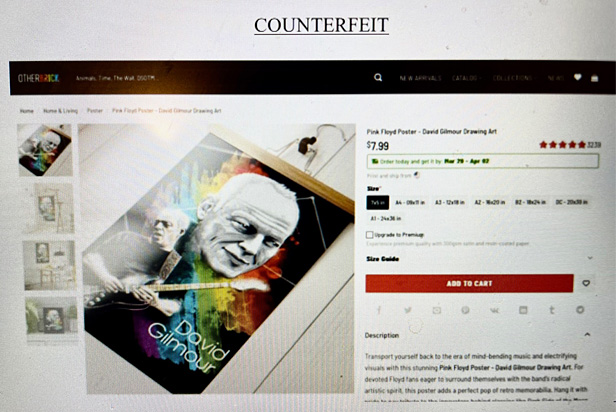News April 25, 2025
Pink Floyd’s David Gilmour Sues Merch Company for Trademark Infringement
OtherBrick says it sells “Pink Floyd-inspired” products, but the lawsuit says the company is illegally profiting off Gilmour.
Key Takeaways
• The Suit: David Gilmour Music Ltd. has sued OtherBrick for allegedly selling counterfeit Gilmour-inspired merchandise.
• Remedies: The company seeks damages, profit turnover and injunctions for the alleged trademark violations.
• The Defendant: OtherBrick says it sells “Pink Floyd-inspired” merch.
David Gilmour wants to send OtherBrick to the dark side of the moon – and it’s all over merch.
A company associated with the legendary Pink Floyd songwriter, guitarist and vocalist has sued OtherBrick for trademark infringement in federal court in Illinois.
OtherBrick sells merchandise collections that, according to its website, feature “Pink Floyd-inspired items, from posters to apparel, reflecting their musical and cultural significance.”

David Gilmour Music Ltd., a United Kingdom-headquartered company that provides official David Gilmour products, says that OtherBrick is leveraging Gilmour’s global fame without permission. The merch purveyor is selling “illegal counterfeits” that infringe on Gilmour’s legally held marks at prices below what legitimate Gilmour merch costs, the suit indicates. Gilmour is not associated with OtherBrick and sees no money from the sale of its products.
“Defendant is using a fake online storefront designed to appear to be selling genuine (Gilmour) products, while selling inferior imitations,” the suit alleges. “Plaintiff is filing this action to combat defendant’s counterfeiting of plaintiff’s registered trademark, as well as to protect unknowing consumers from purchasing unauthorized David Gilmour products over the internet.”

The lawsuit features this image of a poster on the OtherBrick website. It’s one of many examples of trademark infringement that OtherBrick has committed against Gilmour, the complaint says.
Officially alleging trademark infringement, counterfeiting and more, the suit asks a judge to order OtherBrick to surrender profits to Gilmour and pay millions in damages. The complaint also asks the court to enjoin OtherBrick from further infringing actions – which would mean not making, selling, marketing or otherwise having physical products or having an online presence that in any way uses Gilmour’s trademarks.
Gilmour “has been and continues to be irreparably damaged through consumer confusion, dilution, loss of control over its reputation and goodwill as well as the quality of goods bearing the David Gilmour Trademark,” the suit asserts.
The complaint identifies OtherBrick as “an individual and/or business entity who, upon information and belief, likely resides and/or operates in Asia or other foreign jurisdictions.” Still, Gilmour’s company brought the suit in Illinois because OtherBrick conducts business throughout the United States, “including within Illinois and in this judicial district, through the operation of the fully interactive commercial website and online marketplace.”
A search for “David Gilmour” on the OtherBrick site turned up seven pages worth of merchandise – with T-shirts, hoodies, candles, posters, headwear, bags and other products bearing graphics that included Gilmour’s name, image and/or references to his music.
Working with graphics, logos and on-product messaging, print and promotional products professionals have to be smart about navigating potential trademark issues.
Trademark pros have filled ASI Media in on strategies for avoiding trademark infringement – and what to do if your marks have been infringed upon. One tip to avoid infringement? Engage in a trademark search in the U.S. Patent and Trademark Office’s Trademark Electronic Search System (TESS).
“By entering prospective marks of interest in TESS, business owners can identify and eliminate highly similar marks from their short list,” said Derrick Davis, a trademark attorney, “which ultimately saves time and money in any legal fees to be incurred.”
